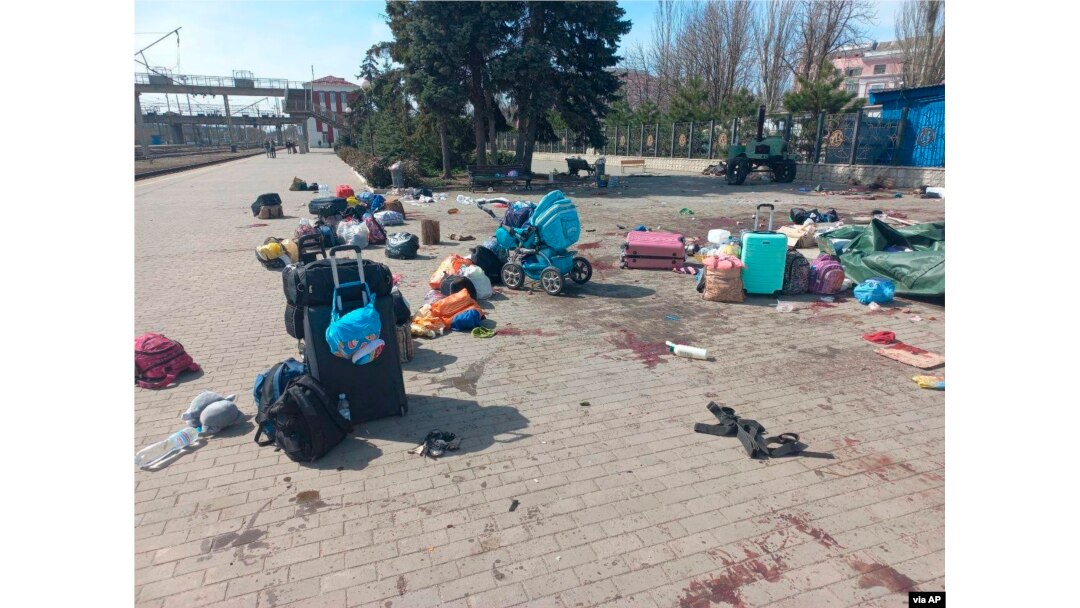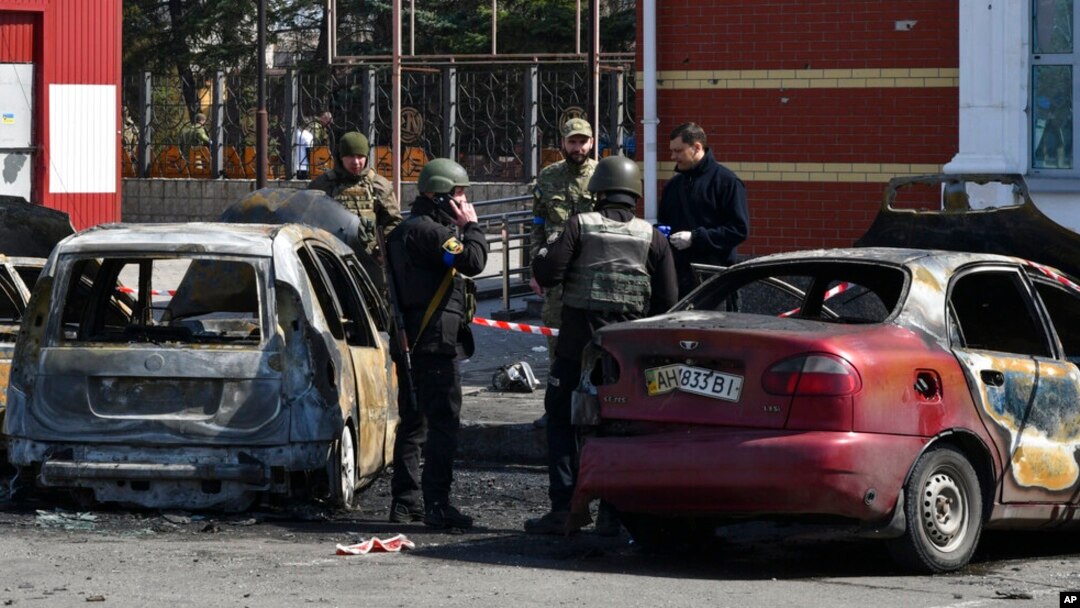Ukraine and its allies condemned a deadly missile attack on a crowded Ukrainian railway station Friday, blaming Russia for the carnage.
Ukrainian state railway officials said at least 52 people were killed, including five children, and at least 87 people were wounded at the station in the eastern Ukrainian city of Kramatorsk that was being used to evacuate civilians.
Ukrainian President Volodymyr Zelenskyy called the strike a deliberate attack on civilians.
"Without the strength or courage to stand up to us on the battlefield, (Russian troops) are cynically destroying the civilian population," Zelenskyy said on social media.
In his nightly video address Friday, Zelenskyy said, "We expect a firm global response to this war crime."
He said efforts would be taken by Ukraine “to establish every minute of who did what, who gave what orders, where the missile came from, who transported it, who gave the command and how this strike was agreed to."
Britain’s Defense Ministry said in its intelligence update Saturday that Russia is continuing “to hit Ukrainian non-combatants, such as those killed in yesterday's rocket strike” on the railway station.

In this photo published on Ukrainian President Volodymyr Zelenskyy's Telegram channel, blood stains are seen among bags and a baby carriage on a platform after a missile struck a railway station in Kramatorsk, Ukraine, April 8, 2022.
“Russian ambitions to establish a land corridor between Crimea and the Donbas,” the ministry also said, are being “thwarted by Ukrainian resistance.”
Zelenskyy, in an interview scheduled to air on U.S. television Sunday on the CBS program 60 Minutes, said Ukraine has imprisoned Russian pilots who had maps with civilian targets designated for bombing.
U.S. President Joe Biden said on Twitter that the attack was another "horrific atrocity committed by Russia," while British Defense Minister Ben Wallace said the "striking of civilians and critical infrastructure is a war crime."
The United Nations called the assault on the railway station and other attacks "completely unacceptable" and "gross violations of international humanitarian law and international human rights law, for which the perpetrators must be held accountable."
U.N. spokesperson Stephane Dujarric reiterated Secretary-General Antonio Guterres' call for an "immediate end to this brutal war."
Your browser doesn’t support HTML5
UN Condemns Deadly Missile Attack on Ukraine Railway Station
Two missiles are said to have struck the train station in Kramatorsk. Officials in the Donetsk region said thousands of people were at the station trying to leave for safer areas as the region readied for a major Russian offensive.
Russia denied carrying out the missile strike and in turn blamed Ukraine, saying it does not use the kind of missile — the Tochka-U — that hit the station.
However, the website Defence Blog reported on March 31 that a convoy of Russian military vehicles carrying the recently retired missiles — known in the West as the SS-21 or Scarab — had been photographed as part of Russia's invasion force into Ukraine.
Also Friday, U.S. Defense Secretary Lloyd Austin spoke with Ukrainian Defense Minister Oleksii Reznikov about "the needs of the Ukrainian military to defend its country."
Austin praised Slovakia's announcement Friday that it would send an S-300 air defense system to Ukraine, calling the system "a critical defensive capability."
During a Friday briefing, Pentagon spokesperson John Kirby said the United States would temporarily send a Patriot missile system, manned by U.S. service members, to Slovakia to replace the S-300 system.
He added that the biggest need for the Ukrainian military was "literally millions of rounds" of small arms ammunition.
"We want to see Mr. [Russian President Vladimir] Putin and the Russian army lose this fight inside Ukraine. … We want to see Ukraine whole again," he said.
Kirby also cast doubt on Russia's claim it was not involved in Friday's attack on the train station.
"We find unconvincing Russian claims that they weren't involved," he said.
The European Union formally enacted more sanctions on Russia Friday, as European Commission President Ursula von der Leyen and EU foreign policy chief Josep Borrell traveled to Kyiv in a show of support for Zelenskyy.
EU Commission President Ursula von der Leyen, center, looks at covered bodies of killed civilians in Bucha, on the outskirts of Kyiv, Ukraine, April 8, 2022.
The new measures include bans on imports of coal, wood and chemicals and a block on all transactions with four Russian banks.
While in Ukraine, the EU officials also went to Bucha, where Russian troops allegedly massacred civilians. Ukrainian officials said a forensics team Friday began exhuming a mass grave in the town.
Ukraine's government blames Russian troops, which recently withdrew from the area, for the killings. Russia denies that its forces target civilians.
Von der Leyen said the killings showed the "cruel face" of Putin's army, Reuters reported. "The unthinkable has happened here," she said.
Russian troops have fully withdrawn from northern Ukraine and moved into Belarus and Russia, Britain's Defense Ministry said Friday. The intelligence update said some of the forces would likely be deployed to eastern Ukraine to fight in the Donbas, a Ukrainian region bordering Russia.
On Thursday, Russia provided its starkest assessment of the invasion, with Kremlin spokesperson Dmitry Peskov describing its rising troop losses as a "tragedy" to Sky News. In addition, Prime Minister Mikhail Mishustin said that Russia was facing its most difficult economic situation in 30 years because of the Western sanctions, The Guardian reported.
Late Thursday, Zelenskyy said the situation in the town of Borodyanka, about 60 kilometers northwest of Kyiv, was worse than that in Bucha.
"It is significantly more dreadful there. Even more victims from the Russian occupiers," Zelenskyy said.
VOA's Jeff Seldin, Patsy Widakuswara and Masood Farivar contributed to this report. Some information came from The Associated Press and Reuters.


